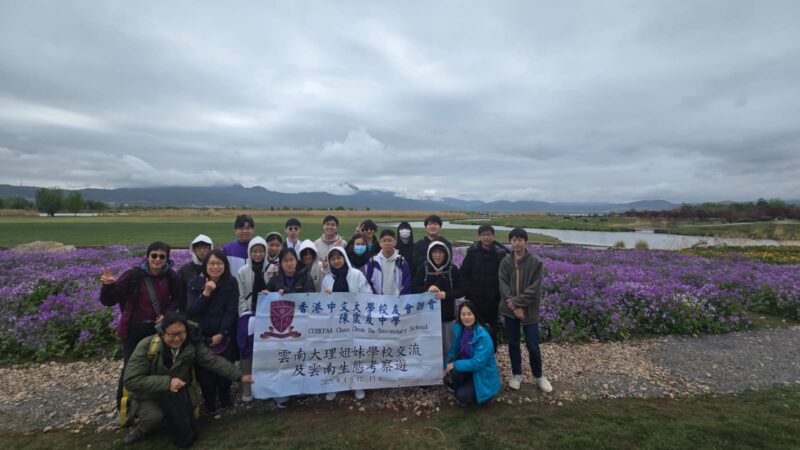
From April 12 to April 19 this year, our Principal, Ms Ho Suk Yin, together with 18 teachers and students, visited our sister school, Yunnan Dali Zhou Minzu High School (referred to as Minzhong), and conducted ecological research in Dali, Lijiang, and Tengchong.
The visit to the sister school left a deep impression on the teachers and students. In addition to the warm welcome from local teachers and students, we observed how quickly the Minzhong students entered a learning state as soon as the class bell rang: over sixty students listened attentively; when the teacher asked a question, the entire class responded as a whole. We also attended a break after three classes where all students ran laps together in the school playground, which was quite impressive. That afternoon, we explored Dali's Xi Lake with some Minzhong students, visiting farmers and sharing dinner. During our visit, we learned that environmental protection measures near the Xi Lake have become stricter than in the past—purple garlic cannot be planted, fishing is prohibited, and even rural tourism and boat services must be halted. As a result, residents' incomes have decreased, and with subsidies not reaching villagers, older residents have to rely on their children working outside for support. It is clear that sustainable development must strive to balance people and the environment, and efforts should be made to involve locals in conservation work that can provide livelihoods, such as serving as managers or guides in protected areas, or crafting souvenirs. The government can play a role as a connector and administrator.
In addition to interacting with Minzhong teachers and students, we also investigated the sustainable development in Yunnan. Among the various activities, the highlight was the performance of ""Impression Lijiang,"" where the stunning backdrop of Jade Dragon Snow Mountain complemented the impressive and synchronized performances of the actors, showcasing the spirit and straightforwardness of ethnic minorities, as well as their passionate pursuit of love and life, which left a lasting impression of the minority cultures.
During the trip, we were particularly impressed by Mr. Lu Wen, who runs the Dali Owl Ecological Village. He works hard to rescue animals and promote sustainable development in his village. From his lectures, we learned that even a corner of a courtyard should be considered for its ecological impact; fallen leaves can foster bacteria necessary for ecological cycles, benefiting plants, insects, and birds. To attract different insects, Mr. Lu built insect hotels; he arranges suitable sand for filtering water quality; nearby land is farmed organically, and owls are introduced to control crop-destroying rodents, resulting in a more well-equipped village. Under Mr. Lu's guidance, our students learned to install owl nesting boxes, contributing to ecological conservation, and we also participated in releasing white-bellied pheasants and buzzards back into nature. Mr. Lu even installed satellite trackers to monitor their release, showing how many released birds still face dangers from various threats and may require further rescue, demonstrating his dedication to ecology.
During this activity, the students also visited The National Memorial Cemetery in Tengchong County, which was truly awe-inspiring! Tengchong holds an important place in wartime history. In September 1944, after more than a hundred days of battle, brave Chinese soldiers and civilians finally repelled the aggressive Japanese invaders, with over ten thousand of our soldiers sacrificing their lives. Their heroic deeds are deeply moving, and every statue in the cemetery tells a memorable story.
The eight-day itinerary also included visits to Baohua Ridge and Qihua Ridge in the Gaoligong Mountains, the Tengchong Volcanic Geothermal National Geological Park, the Beihai Wetland Reserve, and Cangshan Mountain, among others. The beautiful landscapes showcased a variety of birds and plants, indicating that ecological issues in Yunnan are being taken seriously. The teachers and students gained rich insights and a broader understanding of the country!